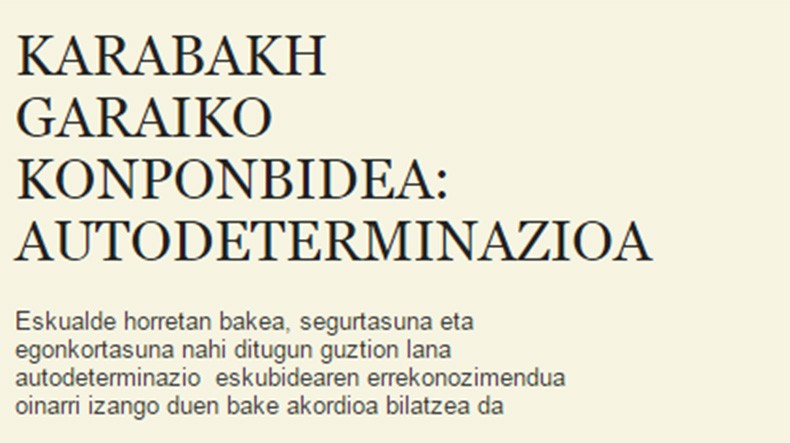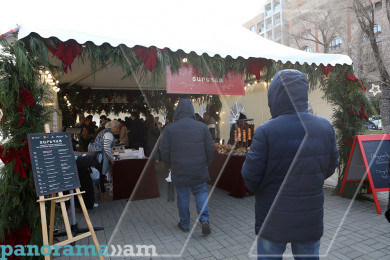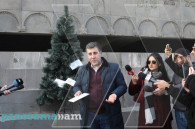
The Resolution of the Nagorno Karabakh conflict: Self-determination
by Rafa Larreina and Urko Aiartza
Former MP and Former Senator and lawyer
The effort that all the ones that want peace, security and stability in this region should seek a peace agreement that has as its core the right to self-determination.
2016/04/10
The first days of April have confirmed what the diplomatic atmosphere in recent months, and what of course, the people in is called the Karabakh contact line were feeling: the Azerbaijan army has launched an attacked of an unknown intensity since 1994, and, with that, the now 22-year-old cease-fire has been broken down. It is not, of course, the first time that the contact line has been attacked (dozens have been every year), but those of these days have other indications, because of the armament being used (drones, helicopters, tanks); due to the losses that have been (dozens dead), as well as the effects (the control of the land points stablished until now). Even if a new cease-fire agreement has been agreed, the situation is fragile.
The conflict of Nagorno-Karabakh has been established or defined between the frozen conflicts. Frozen, of course, as the international community has not been able to provide a solution.
In the long struggle that the Armenian people has taken to own their destiny, Nagorno-Karabakh, historically populated by a vast majority of Armenians of Artsakh, after the Russian Revolution and the First World War stayed in the Soviet Socialist Republic of Azerbaijan as an autonomous oblast. The local Armenian people did not accept this, and, at the time of perestroika, the citizens of Nagorno-Karabakh, voted for independence in accordance with the right to self-determination of the peoples approved by the Soviet Union. War started, and in that war, the Armenian army came to help their Nagorno Karabakh brothers. By 1994, Artsakh and Armenian forces controlled Nagorno-Karabakh and a large area of land surrounding Azerbaijan, as a buffer zone or security area, and at the same time, Nagorno Karabakh acquired a land between Nagorno-Karabakh and Armenia on his own military terms.
In 1994, and under the leadership of Russia a ceasefire was agreed. Under the leadership of the OSCE, Minsk Group was created in order to achieve a peaceful and dialogued solution for the Azerbaijan, Armenia and Nagorno-Karabakh conflict. There were France, the United States, Turkey, Russia, Germany, Italy, Belarus, Portugal, Holland, Sweden, Finland, as well as in Armenia and Azerbaijan; however, Nagorno-Karabakh is not. But the Minks agreements never went further nor back; and the agreed peace conference has not been celebrated in these long years. Azerbaijan is not ready to accept the right of Nagorno-Karabakh to self-determination and argues on the principle of territorial indivisibility of states to deny the reality of Artsakh.
Meanwhile, and moreover, Azerbaijan, given the profits of oil, has had the ability to strengthen its military and diplomatic relations, as well as its war rhetoric. The line of contact is known to be the most militarized area all over Europe. Russia's military and economic agreements with Armenia do not prevent them from being a major seller of weapons to Azerbaijan, and in this intent to heat the region, of course, Azerbaijan has the full protection of Turkey, its historical ally. Turkey has great interests all over the Caucasus region, gets together with the Turkmen heritage peoples in the region, having Armenia as its historic enemy - the lack of recognition of the Armenian genocide is signal of that fact-. If to all this we add the recently opened dispute with Russia, we will realize that the region is a hot bubbling pot.
In this situation, however, we would like to emphasize that on the election observation visit made to the independent Republic of Artsakh (called like that by the inhabitants of the Republic of Nagorno-Karabakh) during last year's election, we found a people that wants to live freely and in accordance with democratic principles and regulations. No one would have imagined that in this tiny nation of 150,000 inhabitants, where at any time since 1994 there is the risk to suffer an attack, and which had suffered a four long years of horrible war (approximately 30,000 dead), such a democratic strength that we found ourselves there. Party plurality; local, national and presidential elections; international law provided by an independent judicial power; freedom of the press, public university... Although not recognized internationally, and over the boundaries that that bring, an independent Republic that lives in freedom and dignity.
Unfortunately, however, before the citizens right to decide, before the right to live in an independent republic that has become a reality, those who by armed force implement the principle of unity of the national honor are willing to endanger peace and security and by force of arms in their implementation of the principle of unity of the national honor of those who are willing to endanger peace and security in Europe in the other side of Europe. The peace between Nagorno Karabakh and Azerbaijan first needs of the recognition of the right to self-determination of Artsakh Republic.
In the same way that peace between peoples anywhere in the world needs of respect and recognition between the peoples. And in this region the effort that all the ones that want peace, security and stability in this region should seek a peace agreement that has as its core the right to self-determination.
Newsfeed
Videos






























